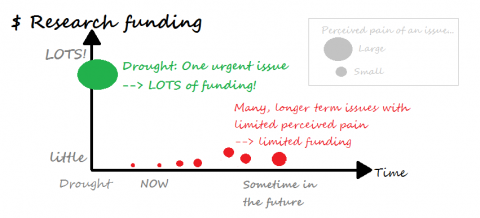Hand-on-heart, what do you think when you hear ‘water research strategy’? Do you picture: universities, lab coats, bacteria cultures, test tubes and similar ‘geeky’ paraphernalia? In that case, it may come as surprise that the National urban water research strategy goes well beyond the ‘traditional’ research areas.
Before we dive in let’s take a quick look back. Research has been a key cornerstone to progress in the water industry, and will remain critical moving forward. In the past research led to new efficient and effective ways for treating sewage, better understanding of catchment risks and avoidance of the expense of multi-million dollar treatment plants. In their recently released report Australia 2030: navigating our uncertain future, CSIRO estimates that R&D investment contributes around 50% of GDP growth in developed countries, and that advanced physical and mathematical sciences make a direct contribution to the Australian economy of around $145B a year (use these stats next time someone tells you science is boring!).
To identify future research needs, WSAA has developed the National urban water research strategy, together with our members and other key stakeholders. The National Urban Water R&D Partnership Working Group tasked WSAA to develop this strategy, primarily because our members increasingly provide the majority of the urban water research investment in Australia. This is largely due to the contraction of government funding since the drought, as urgent pressure on the water industry has eased (at least in the eastern parts of the country).
However, the number of questions worthy of researching to ensure the industry is fit for the challenges of today and tomorrow keeps growing , and the industry needs our investment to be fit for the future.

A tongue in cheek attempt to illustrate the situation of funding into water industry research.
What are the challenges of the future? What’s out there, with the potential to influence and change the water industry?
Turns out there is more than enough to keep water industry researchers busy.
A team of experts from the Research Managers’ Network scanned a number of reports from trusted sources such as the World Economic Forum, CSIRO, World Business Council for Sustainable Development. The scan revealed that the nature of research in urban water needs to change.
The focus is no longer just on ‘traditional’ research areas such as water quality and treatment. Instead urban water research is increasingly influenced by ‘macro-systemic’ questions, from social (customer values, societal changes), analytical (big data), financial and political (regulations, urban planning) fields. This trend is also visible in the research strategies of other international water research brokers, including those of Water Research Foundation (US) and the UK Water Industry Research.
CSIRO’s recent report confirms the breadth and potential of the future challenges, with the energy-water-food nexus being at the heart of their analysis of seven megatrends, including:
- ‘Digital immersion’ (transformation due to growing connectivity of people, businesses and ‘things’),
- ‘Planetary pushback’ (climate change impacts)
- ‘More from less’ (the need to innovate to make most of our limited resources)
For believers in word counts, CSIRO’s report features ‘water’ 32 times, exactly as often as ‘digital’!
Overall, and in a collaborative effort, the National urban water research strategy identifies 15 research areas, with four already being developed further:
- Translating customer values and behaviours into enterprise value: Quantifying the tangible and intangible benefits of customer engagement.
- Develop an accepted methodology to determine the economic value of monetary and non-monetary benefits of integrated water management, including where benefits are localised.
- What does the future water industry worker look like?
- Identifying, enabling, and harnessing new technology and materials.
We have started implementing the strategy, and collaboration is key as our Executive Director Adam Lovell explains: “The National urban water research strategy will allow the water industry to focus research efforts on issues of national significance and in response to global trends. By working together, we will avoid duplication and maximise opportunities to collaborate, which results in financial efficiencies for all.”
We are working across the water industry, and with research brokers both overseas, and at home with Water Research Australia. Collaboration in research will allow the industry to maximise the leverage of funds across the wide range of questions that need to be addressed to be ready for the many challenges of the future (and yes, on occasion a lab coat will still be needed).
Visit our publications library to download the National urban water research strategy.
